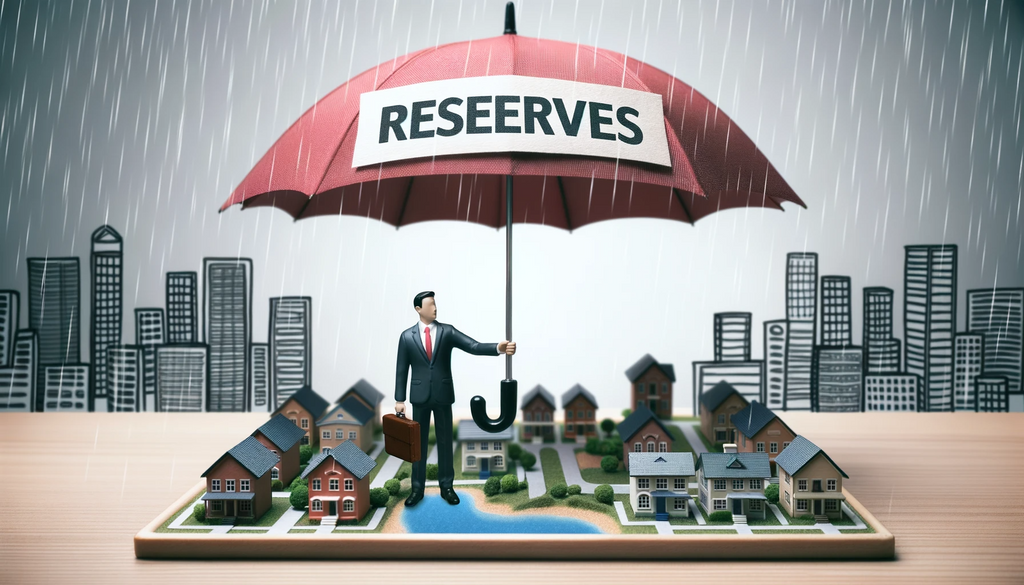Reserves play a crucial role in property management, providing a financial safety net for unexpected expenses. In this blog post, we will explore the significance of reserves and why they are essential for both individuals and businesses in the real estate industry.
What are Reserves?
Reserves are savings accounts that are specifically set aside by individuals or businesses to cover future costs in real estate. These funds serve as a safety net and are designated for unexpected big expenses that may arise in property ownership. Whether you own a single property or manage multiple properties, having reserves is essential to ensure financial stability and to avoid any unforeseen financial strain.
One of the primary purposes of reserves is to address major repair and maintenance issues that may occur in real estate properties. Roof leaks, AC issues, or broken pipes are just a few examples of unexpected expenses that might arise, requiring immediate attention and funds. By having reserves, property owners or managers can avoid scrambling for money or resorting to credit in these situations. Instead, they can tap into their reserves to cover the necessary costs and ensure that the property remains well-maintained.
The amount of money to be set aside as reserves can vary depending on several factors, such as the type and size of the property, its age, and the specific risks associated with it. Typically, property managers suggest allocating a certain percentage of the property’s value or monthly rental income to build up the reserves. This ensures that the account grows over time and can accommodate larger expenses when they occur.
Property managers often hold reserves in the owner’s account to ensure that there is enough money available to cover potential expenses. This arrangement allows for easy access to funds when needed and provides transparency to property owners regarding the state of their reserves. By having reserves managed by professionals, property owners can rest assured that their investment is being protected and that necessary repairs and maintenance can be promptly addressed.
In addition to unexpected repair costs, reserves can also be used to cover other financial obligations related to property ownership. These may include property taxes, insurance premiums, or even vacancies that result in temporary loss of rental income. Having reserves in place provides a buffer to handle these situations without having to dip into personal funds or disrupt cash flow.
Ultimately, reserves serve as a crucial tool for property owners and managers to ensure the financial stability and long-term sustainability of real estate investments. By setting aside funds for unforeseen expenses, property owners can proactively address issues as they arise, rather than being caught off guard. With reserves in place, property owners can have peace of mind, knowing that they are well-prepared to handle any challenges that come their way.
The Recommended Reserve Amount
In property management, having a recommended reserve amount is crucial. This amount serves as a safety net and ensures that property managers can effectively handle unforeseen circumstances that may arise during the management of a property.
The recommended reserve amount typically falls within the range of $300 to $500 per month. This range has been found to be adequate for accumulating sufficient funds over time. Property managers aim to build up reserves gradually to ensure that they have the necessary financial resources to address any unexpected expenses that may come their way.
It is important to note that property managers have to strike a balance between building reserves and meeting the financial expectations of their clients. While property managers understand the importance of having adequate reserves, clients often prefer to receive most of their money immediately and may be hesitant to allocate a significant portion of their funds towards reserves.
Property managers are aware of their clients’ preferences and strive to keep reserves as low as possible while ensuring that they have enough to cover unexpected expenses. They may use various strategies to achieve this balance, such as carefully monitoring expenses, negotiating competitive prices with vendors, and implementing efficient maintenance practices to minimize costs.
The recommended reserve amount is essential for property managers for several reasons. Firstly, it allows them to be prepared for emergencies and unexpected repairs. Property management involves overseeing multiple units, and it is inevitable that issues will arise from time to time. Having reserves readily available ensures that property managers can promptly address these issues without causing significant disruptions to the tenants.
Secondly, the recommended reserve amount contributes to the overall financial stability of the property. By having reserves, property managers can avoid relying on immediate rental income for every expense. This provides a degree of flexibility and allows for better long-term financial planning.
Lastly, having a recommended reserve amount demonstrates professionalism and a commitment to providing reliable property management services. Clients and tenants value property managers who are prepared and capable of handling unexpected situations. Reserves provide a sense of security, knowing that property managers have resources in place to address any challenges that may arise.
In conclusion, the recommended reserve amount in property management typically ranges between $300 to $500 per month. Property managers aim to accumulate sufficient funds over time to handle unforeseen circumstances while also considering the financial expectations of their clients. Reserves are essential for ensuring readiness, financial stability, and professionalism in property management.
Reserves for Personal Investments and Investor Clients
While minimizing reserves may be desirable for some clients, it is advised to have a cash reserve of at least $10,000 per property for personal investments and investor clients. This substantial reserve is necessary because unexpected events like move-outs, damages, or AC unit failures can occur in quick succession. Having a sufficient reserve ensures that property managers can promptly address these issues without causing financial strain.
When it comes to personal investments and managing properties for investor clients, having an adequate cash reserve is crucial. While some individuals may prefer to minimize reserves in order to maximize profits, it is important to balance the potential returns with the potential risks. By maintaining a cash reserve of at least $10,000 per property, property managers can safeguard against unforeseen circumstances that can arise in the property management industry.
One of the main reasons why a substantial cash reserve is recommended is due to the unpredictable nature of property management. Move-outs, damages, and AC unit failures can occur suddenly and without warning. These events not only require immediate attention but also incur costs that can strain a property manager’s finances if they are not adequately prepared.
Having a sufficient cash reserve allows property managers to promptly address these issues without causing financial strain. It provides them with the resources needed to hire maintenance personnel, repair damages, and cover any expenses associated with unforeseen circumstances. This ensures that the property can be quickly restored to a desirable state and minimizes the impact on the investor’s returns.
Additionally, a healthy cash reserve provides peace of mind to both property managers and investor clients. It allows property managers to approach their tasks with confidence, knowing that they have the necessary funds to handle emergencies and unexpected events. Investor clients also benefit from this security, as they can trust that their investment is being managed by professionals who are well-prepared to handle any situation that may arise.
In conclusion, while minimizing reserves may seem tempting for personal investments and investor clients, it is highly recommended to maintain a cash reserve of at least $10,000 per property. The property management industry is prone to unpredictable events, and having a sufficient reserve ensures that property managers can promptly address these issues without causing financial strain. This not only protects the financial interests of the property managers but also provides peace of mind to investor clients.
Conclusion
In conclusion, reserves play a fundamental role in property management, offering essential financial security and peace of mind for both individuals and businesses. The allocation of reserves to cover unexpected expenses is crucial in ensuring the successful management of properties. Property managers strive to keep reserves as low as possible to meet client preferences; however, it is highly recommended to maintain a reserve of at least $10,000 per property for personal investments and investor clients.
By maintaining adequate reserves, property managers can effectively handle unforeseen circumstances and protect the value and profitability of the properties they manage. Let’s delve further into the importance of reserves and how they contribute to successful property management.
Financial Security and Peace of Mind
Property management involves dealing with various uncertainties and unexpected expenses. Having reserves set aside provides a sense of financial security and peace of mind for property owners and investors. Reserves act as a safety net, covering unforeseen repairs, maintenance, or emergencies arising in properties. This ensures that the property manager can address issues promptly without causing significant financial strain to the owner.
Meeting Client Preferences
While low reserves may seem ideal to some property owners, it is essential to strike a balance between meeting client preferences and ensuring financial stability. Property managers may aim to keep reserves as low as possible to satisfy clients, but maintaining an adequate reserve minimizes the risk of financial hardship caused by unforeseen circumstances.
Recommended Reserve Amount
Based on industry standards and best practices, it is strongly recommended for property managers to maintain a reserve of at least $10,000 per property. This amount takes into account potential repairs, legal fees, vacancies, and other unforeseen expenses. By setting aside this recommended reserve, property managers can respond swiftly and effectively to any emergencies or setbacks that may arise.
Preserving Property Value and Profitability
A well-maintained property holds its value and attracts quality tenants. By having reserves available to address maintenance issues promptly, property managers can actively preserve the value and profitability of the properties under their management. Neglecting property maintenance due to insufficient reserves can lead to costly repairs and a decline in property value, ultimately impacting the owner’s return on investment.
In summary, reserves are an essential component of property management, providing financial security and peace of mind. While property managers aim to keep reserves as low as possible to meet client preferences, it is strongly recommended to maintain a reserve of at least $10,000 per property for personal investments and investor clients. By doing so, property managers can effectively handle unforeseen circumstances, preserve property value, and maintain the profitability of the properties they manage.






